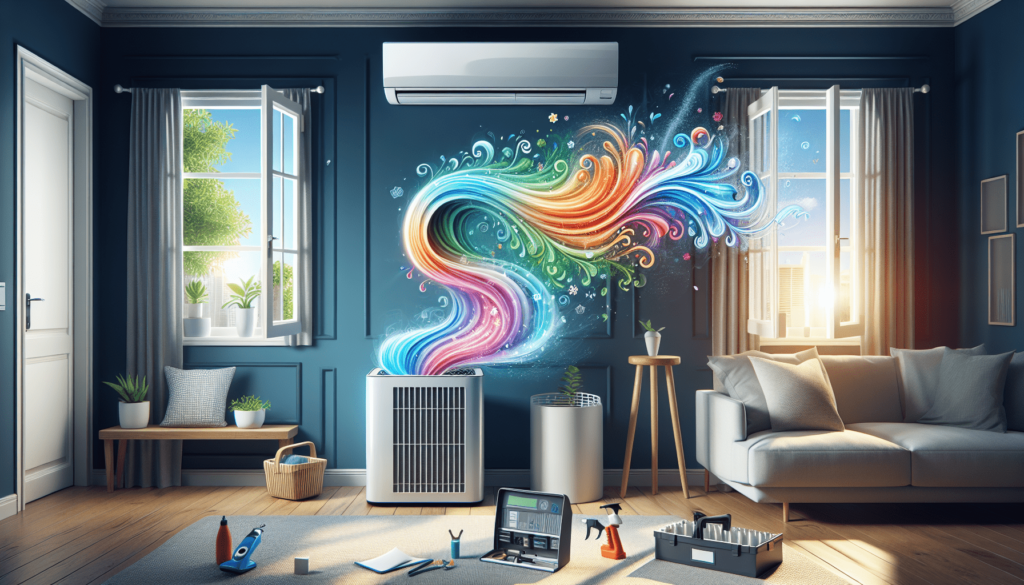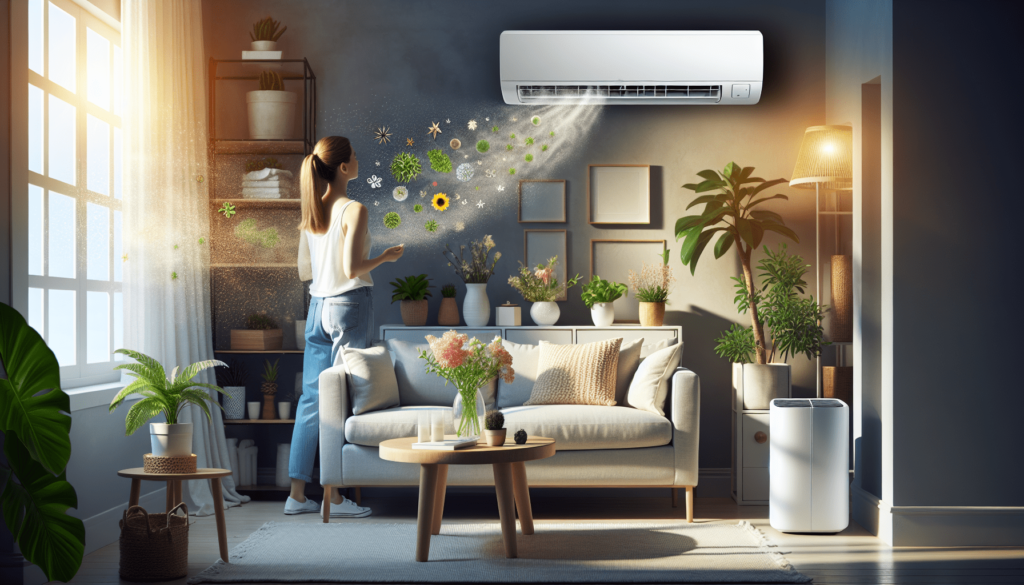26April 2024
If you’re looking to enhance the air quality in your home, air conditioning can be a game-changer. With the right techniques and practices, you can effectively purify the air inside your home and create a clean and healthy environment for you and your loved ones. From regular maintenance and proper ventilation to the use of air purifiers, this article will provide you with the best tips and tricks to improve the air quality in your home using air conditioning. So sit back, relax, and let’s explore the wonderful world of fresh and clean air.

Understanding the Importance of Good Indoor Air Quality
Indoor air quality refers to the quality of the air within and around buildings, especially as it relates to the health and comfort of its occupants. Poor indoor air quality can have a significant impact on your health and well-being, so it’s essential to understand the importance of maintaining good air quality in your home.
Impacts of poor indoor air quality on health
When the air in your home is polluted or contains harmful pollutants, it can have various adverse effects on your health. Some common health issues associated with poor indoor air quality include allergies, asthma, respiratory problems, headaches, and fatigue. These symptoms can significantly impact your daily life and overall quality of life.
Environmental advantages of healthy indoor air quality
In addition to the health benefits, maintaining healthy indoor air quality also has environmental advantages. Improving air quality in your home can reduce energy consumption, as well as greenhouse gas emissions. It can also help decrease the amount of outdoor air pollution that enters your home, contributing to a cleaner and healthier environment for everyone.
Basics of How Air Conditioning Improves Air Quality
Air conditioning systems play a crucial role in improving indoor air quality. Understanding how these systems work and their benefits can help you make informed decisions about your home’s air quality.
How AC units work
Air conditioning units work by pulling in warm air from your home, passing it over cooling coils, and then circulating the cooled air back into the living space. This process helps regulate temperature and humidity, creating a more comfortable and healthier indoor environment.
Benefits of air conditioning on indoor air quality
Air conditioning not only cools the air but also filters it, removing dust, pollen, and other pollutants. This filtration process helps improve air quality by reducing the number of irritants and allergens in the air, leading to fewer respiratory issues and a healthier living environment.
Potential negatives of AC units on air quality
While air conditioning systems have numerous benefits, it is essential to be aware of their potential negative impact on air quality. Improper maintenance or neglecting to change air filters regularly can lead to the buildup of dirt, dust, and other contaminants within the system. This can diminish the air conditioning unit’s ability to filter and improve air quality, resulting in potential health hazards.
Air Filters and Their Role in Air Conditioning
Air filters are a vital component of air conditioning systems, as they help remove airborne pollutants and particles from the air. Understanding the different types of filters and their role in improving air quality is essential.
Types of air filters
There are various types of air filters available for air conditioning systems, including fiberglass filters, pleated filters, electrostatic filters, and high-efficiency particulate air (HEPA) filters. Each type of filter has different capabilities in terms of capturing and trapping different sizes and types of particles.
How air filters improve air quality
Air filters work by trapping and removing particles from the air as it passes through the filter media. This process helps reduce the number of allergens, dust, mold spores, and other pollutants in the air, resulting in cleaner and healthier indoor air quality.
The importance of regular filter changing and maintenance
Regularly changing and maintaining your air filters is crucial to ensure optimal performance and air quality. Over time, filters can become clogged with dirt and debris, reducing their effectiveness. By regularly replacing filters according to the manufacturer’s recommendations, you can maintain clean and healthy air in your home.
Choosing the Right Air Conditioning System
Choosing the right air conditioning system for your home goes hand in hand with improving indoor air quality. Considering various factors when selecting a system can greatly impact the air quality in your living space.
What to consider when choosing an air conditioning system
When choosing an air conditioning system, it’s important to consider the size of your home, your climate, energy efficiency ratings, and the overall air quality you want to achieve. Consulting with a professional HVAC specialist can help you determine the best system for your specific needs.
Exploring different types of AC systems for air quality
There are several types of air conditioning systems available, including central air conditioning, ductless mini-split systems, and window units. Each system has its advantages and disadvantages, so it’s crucial to evaluate them in terms of their impact on air quality before making a decision.

Proper Installation of Air Conditioning System
Proper installation of an air conditioning system is just as crucial as selecting the right system. Professional installation ensures optimal performance and can significantly affect the air quality in your home.
Why professional installation is important
Professional installation of an air conditioning system ensures that it is correctly sized, properly positioned, and effectively connected to the ductwork or ventilation system. Improper installation can lead to issues such as airflow problems, inefficient cooling, and compromised air quality.
The impact of installation on air quality
During the installation process, HVAC professionals pay attention to ensuring that the air conditioning system is airtight, minimizing the potential for outdoor pollutants and allergens to enter your home. Additionally, proper installation ensures that the system’s filtration and ventilation are functioning correctly, effectively improving air quality.
Regular Maintenance of Your Air Conditioning System
Regular maintenance of your air conditioning system is crucial for maintaining optimal performance and improving air quality in your home. Routine inspections, cleaning, and maintenance tasks play a significant role in keeping your system operating at its best.
Routine inspections and service
Regular inspections and service by HVAC professionals help identify any potential issues with your air conditioning system before they become major problems. These routine checks ensure that all components are clean, functioning correctly, and capable of providing clean and cool air.
Cleaning and maintaining your system for optimal performance
Keeping your air conditioning system clean is essential for maintaining good indoor air quality. Regularly cleaning or replacing air filters, cleaning evaporator coils, and clearing debris from outdoor units can help ensure that your system is functioning efficiently and effectively removing pollutants from your home.
Utilizing Air Purifiers in Combination with Air Conditioning
In certain situations, using air purifiers in conjunction with your air conditioning system can further enhance indoor air quality and remove even more pollutants from the air.
The benefits of air purifiers
Air purifiers are designed to remove pollutants, allergens, and other particles from the air, providing an additional level of filtration. They can effectively capture and eliminate dust, pet dander, pollen, mold spores, and even certain bacteria and viruses, resulting in cleaner and healthier indoor air.
Choosing the right air purifier for your home
When selecting an air purifier, it’s essential to consider factors such as the size of your home, your specific air quality needs, and the type of pollutants you want to remove. Different air purifiers have varying features and capabilities, so researching and consulting with professionals can help you choose the most suitable option for your home.
Understanding and Controlling Humidity with Your AC System
Humidity levels play a significant role in indoor air quality. Understanding how your air conditioning system manages humidity can help you maintain the ideal balance for a healthy and comfortable living environment.
How humidity affects air quality
High humidity levels can promote the growth of mold, mildew, and bacteria, leading to poor air quality and potential health issues. Low humidity levels, on the other hand, can cause dryness and discomfort, affecting respiratory health and worsening allergy symptoms.
How an AC system manages humidity
Air conditioning systems help manage humidity levels by removing excess moisture from the air during the cooling process. This dehumidification feature not only improves comfort but also reduces the likelihood of mold growth and the presence of other moisture-related allergens.
Additional Tips for Improving Indoor Air Quality
In addition to utilizing air conditioning systems and air purifiers, there are several other steps you can take to further improve indoor air quality in your home.
Keeping your home clean
Regular cleaning practices, such as vacuuming, dusting, and mopping, can help remove dust, pet dander, and other particles from surfaces and improve air quality. Paying attention to frequently overlooked areas, such as carpets, upholstery, and window treatments, can make a significant difference.
Optimizing ventilation
Improving ventilation in your home can help remove stale air and bring in fresh outdoor air, reducing the buildup of indoor pollutants. Opening windows, using exhaust fans in kitchens and bathrooms, and making sure your HVAC system’s ventilation feature is operating correctly are all effective ways to optimize ventilation.
Houseplants and air quality
Certain houseplants can help improve indoor air quality by naturally filtering and purifying the air. Plants like spider plants, peace lilies, and snake plants can absorb harmful gases and release oxygen, contributing to a cleaner and healthier living environment.
Looking Forward: The Future of Air Conditioning and Air Quality
As technology continues to advance, there are exciting developments in air conditioning systems that have the potential to further enhance home air quality.
Emerging technology in air conditioning
New technologies, such as smart thermostats and advanced filtration systems, are being integrated into air conditioning systems to improve energy efficiency and air quality. These innovations allow for better air filtration, humidity control, and personalized comfort settings.
How these developments could improve home air quality
The future of air conditioning holds the promise of even cleaner and healthier air. Advanced filtration systems can better capture and remove allergens, bacteria, and viruses. Smart features can provide real-time air quality monitoring and adjustment, ensuring your home is always at its best in terms of air quality.
In summary, maintaining good indoor air quality is crucial for your health and overall well-being. Utilizing air conditioning systems, along with proper maintenance, choosing the right filters, and considering additional measures such as air purifiers and houseplants, can greatly improve the air quality in your home. As technology continues to advance, we can look forward to even more innovative solutions that will further enhance the future of air conditioning and air quality.
